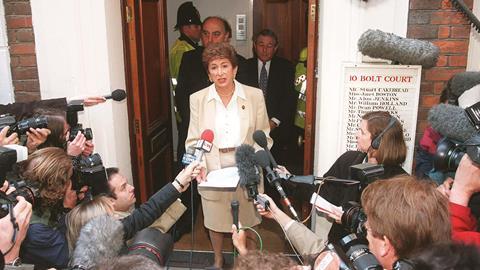Revisiting past haunts can be unsettling. Charles Ryder’s reacquaintance with Brideshead in the final years of the second world war was bittersweet. For unlike his idyllic visit from Oxford University ‘more than twenty years ago… when the ditches were creamy with meadowsweet and the air heavy with all the scents of summer’, Evelyn Waugh’s Captain Ryder was now at Brideshead with his battalion, amid the ‘hazard litter of corrugated iron’ and ‘all the zoo-noises of the battalion beginning a new day’ (Brideshead Revisited, 1945).

But I was led to revisit the leading case of Porter and another v Magill [2001] UKHL 67 by a fascinating, informative and entertaining memoir of public authority experience spanning over 60 years. This is The Winding Stair by local government and legal luminary Sir Rodney Brooke. He, by sheer talent and capacity (per Kipling) to ‘walk with Kings – nor lose the common touch’, rose from lowly municipal office boy to knight of the realm and top public servant. The title of the book comes from philosopher and statesman Francis Bacon who (in his essay Of Great Place 1612/1625) wrote that: ‘The rising unto place is laborious, and by pains men come to greater pains; and it is sometimes base, and by indignities men come to dignities.’ The ascent is also tortuous, for: ‘All rising to great place is by a winding stair.’ This was certainly so in Brooke’s case. Despite a humble background and needing to leave school at 15, he managed to qualify as a solicitor and gradually work his way up the hazardous spiral staircase, to occupy some of the most senior roles in local government and the wider public service, including as chief executive of Westminster City Council (WCC). It is there that he fatefully encountered the Porter in Porter v Magill.
This was Shirley Porter (pictured), leader of WCC. Brooke writes that: ‘After working in West Yorkshire [where he had been chief executive of the former West Yorkshire County Council] with politicians who were pleasant and clever it came as a shock to work with someone who… [had] no ability to think on her feet, nor any concept of the governance of local authorities’. Along with what comes across as an arrogantly autocratic approach, these shortcomings would lead to an expensive finding by the council’s external auditor.
This followed from a social engineering project designed to increase the Conservative vote in marginal wards by selling (rather than re-letting) properties in designated blocks when they became vacant, since it was believed that owner-occupiers would be more likely to vote Conservative. Westminster’s external auditor, John Magill, found, after a long and detailed audit, that ‘the council was engaged in gerrymandering’ which he found to be ‘a disgraceful and improper purpose, and not a purpose for which a local authority may act’. Under the law as it then was (section 20 of the Local Government Finance Act 1982 – popularly known as ‘surcharge’), ‘where a loss has been incurred or deficiency caused by the wilful misconduct of any person’, the auditor ‘shall certify that the sum or… the amount of the loss or the deficiency is due from that person’ which may be recovered for the benefit of the council. In the circumstances, Magill certified that: ‘Three councillors [including Porter and her deputy, David Weeks] and three officers had, by wilful misconduct, jointly and severally caused a loss of approximately £31m to the council which they were liable to make good.’ This figure eventually rose to £42m.
The case found its way to the House of Lords (see reference above) which upheld Magill’s finding. Lord Scott was forthright: ‘This is a case about political corruption… Gerrymandering, the manipulation of constituency boundaries for party political advantage, is a clear form of political corruption.’ Lord Bingham said that a public power (such as section 32 of the Housing Act 1985 to sell land held for housing purposes) is not exercised lawfully if this is not done for a public purpose for which the power was conferred, but instead ‘to promote the electoral advantage of a political party’. In the circumstances he found an ‘unpalatable truth that this was a deliberate, blatant and dishonest misuse of public power’. Lord Bingham also expressed the ‘old and very important principle’ that ‘public powers are conferred as if upon trust that those who exercise powers in a manner inconsistent with the public purpose for which the powers were conferred betray that trust and so misconduct themselves’.
Rodney Brooke’s time at Westminster Council came to a rather abrupt end when he objected to using properties ‘riddled with asbestos’ to house the homeless as ‘a crucial part of [Porter’s] social engineering policy’. For the properties were ‘in a safe Labour ward where their votes could do no harm’. Because Brooke was seen ‘as an insuperable obstacle’ to this policy, he was summoned to Porter’s office and told that his contract would be terminated immediately. This did not, however, halt his continuing rise across many important public and other appointments.
Porter v Magill is well worth revisiting by all local government lawyers and others operating in a political environment. For, although surcharge met its Waterloo on 11 September 1998, the principles underlying the decision remain valid and the judgment also settled the question of bias. I would also recommend The Winding Stair as a rattling good read, a history of modern local government and a wise guide on how to rise in the public service.
Nicholas Dobson writes on local authority, public law and governance
































No comments yet